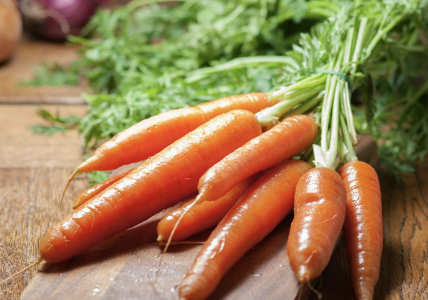The vegetables that may help lower your colon cancer risk, according to new research
By
Veronica E.
- Replies 0
Disclaimer: The information provided in this article is for educational purposes only and is not intended as a substitute for professional medical advice, diagnosis, or treatment. Always consult your physician or other qualified healthcare providers with any questions you may have regarding a medical condition or before making any changes to your health regimen.
If you’ve been told to eat your vegetables your whole life, it turns out there’s even more reason to listen.
A new study suggests that some vegetables may not just be good for your overall health—they could also help reduce your risk of colon cancer.
That’s especially important for older adults, since risk rises with age and most cases are diagnosed after age 50.
While screenings remain essential, diet may offer a powerful way to protect yourself.
Let’s take a closer look at which vegetables stand out, why they matter, and how you can enjoy them without feeling like you’re stuck eating plain salads.

Colon cancer, also called colorectal cancer, is the third most common cancer in men and women in the United States.
While advances in treatment and early detection have saved lives, prevention remains the goal.
Regular screenings and a healthy lifestyle can lower your risk, but researchers continue to search for additional tools—and diet is a big part of that conversation.
In a large study following thousands of adults, researchers compared dietary habits with long-term health outcomes.
They discovered that people who consistently ate certain vegetables had a much lower risk of developing colon cancer than those who rarely did.
The difference was most noticeable in one group of vegetables that you may already know well.
The vegetables that stood out were cruciferous vegetables—a family that includes:
What makes them so special? These vegetables contain compounds called glucosinolates.
When you chew and digest them, glucosinolates break down into substances that reduce inflammation, help detoxify the body, and may even stop cancer cells from growing in the colon.
The researchers found that even a few servings per week made a difference.
Ideally, you should aim for at least 3 to 5 servings weekly.
That could mean steamed broccoli with dinner, a kale smoothie in the morning, or cabbage slaw with lunch.
More is better, but even modest increases can help.
Cruciferous vegetables may have the strongest effect, but fiber-rich vegetables of all kinds support colon health.
Carrots, sweet potatoes, spinach, and bell peppers all feed healthy gut bacteria, keep digestion moving, and reduce inflammation.

Not a fan of bitter greens? No problem.
There are plenty of delicious ways to enjoy these protective vegetables:
Vegetables are powerful, but they’re only one piece of the puzzle. Experts recommend:
It’s never too late to make small changes that add up to big benefits.
By adding more vegetables to your plate—especially cruciferous ones—you’re giving your body extra tools to stay strong and resilient.
Whether you’re trying new recipes, shopping seasonal produce, or simply adding an extra side of greens, each step is a move toward better health and peace of mind.
Read next: Experts reveal the best cooking method to preserve vegetable nutrients

Do you have a favorite way to cook broccoli or kale? Have you added more cruciferous vegetables to your diet recently? Or maybe you’d like to share your experience with colon cancer screening. Your story could encourage others to make positive changes.
Drop your thoughts in the comments below—we’d love to hear how you’re putting these findings into practice.
If you’ve been told to eat your vegetables your whole life, it turns out there’s even more reason to listen.
A new study suggests that some vegetables may not just be good for your overall health—they could also help reduce your risk of colon cancer.
That’s especially important for older adults, since risk rises with age and most cases are diagnosed after age 50.
While screenings remain essential, diet may offer a powerful way to protect yourself.
Let’s take a closer look at which vegetables stand out, why they matter, and how you can enjoy them without feeling like you’re stuck eating plain salads.

Adding more vegetables to your meals can support better long-term health and wellness. Image Source: Pexels / Jill Wellington.
Colon cancer and why it matters
Colon cancer, also called colorectal cancer, is the third most common cancer in men and women in the United States.
While advances in treatment and early detection have saved lives, prevention remains the goal.
Regular screenings and a healthy lifestyle can lower your risk, but researchers continue to search for additional tools—and diet is a big part of that conversation.
Also read: Common body type under scrutiny after study reveals higher cancer risk
The new study
In a large study following thousands of adults, researchers compared dietary habits with long-term health outcomes.
They discovered that people who consistently ate certain vegetables had a much lower risk of developing colon cancer than those who rarely did.
The difference was most noticeable in one group of vegetables that you may already know well.
Also read: Why people "Unknowingly" die of cancer: insights from a pathologist
Cruciferous vegetables: the colon’s best friend
The vegetables that stood out were cruciferous vegetables—a family that includes:
- Broccoli
- Cauliflower
- Brussels sprouts
- Cabbage
- Kale
- Bok choy
- Collard greens
What makes them so special? These vegetables contain compounds called glucosinolates.
When you chew and digest them, glucosinolates break down into substances that reduce inflammation, help detoxify the body, and may even stop cancer cells from growing in the colon.
Also read: Could this simple at-home test reveal hidden cancer before it's too late?
How much should you eat?
The researchers found that even a few servings per week made a difference.
Ideally, you should aim for at least 3 to 5 servings weekly.
That could mean steamed broccoli with dinner, a kale smoothie in the morning, or cabbage slaw with lunch.
More is better, but even modest increases can help.
Also read: Your go-to bread and colon cancer: What the latest science warns us about
Other helpful vegetables
Cruciferous vegetables may have the strongest effect, but fiber-rich vegetables of all kinds support colon health.
Carrots, sweet potatoes, spinach, and bell peppers all feed healthy gut bacteria, keep digestion moving, and reduce inflammation.

Carrots are a fiber-rich vegetable that support healthy digestion and overall wellness. Image Source: Pexels / mali maeder.
Also read: 10 super vegetables that can transform your health immediately!
Easy ways to add more vegetables to your meals
Not a fan of bitter greens? No problem.
There are plenty of delicious ways to enjoy these protective vegetables:
- Roast them: Roasting broccoli, Brussels sprouts, or cauliflower at high heat with olive oil makes them caramelized and sweet.
- Stir-fry: Toss bok choy, cabbage, or bell peppers into a quick stir-fry for flavor and crunch.
- Soup: Blend cauliflower or broccoli into soups for a creamy texture without heavy cream.
- Slaw: Combine shredded cabbage and carrots with a tangy dressing for a refreshing side dish.
- Smoothies: A handful of kale or spinach disappears into a fruit smoothie but still delivers health benefits.
Also read: Doctors are stunned by this $4 grocery store find being called "natural Ozempic"—are you missing out?
Beyond diet: more ways to lower your risk
Vegetables are powerful, but they’re only one piece of the puzzle. Experts recommend:
- Get screened: Colonoscopies and other tests catch problems early.
- Stay active: Movement keeps your digestive system healthy.
- Limit red and processed meats: Cutting back can reduce risk.
- Watch your weight: Healthy weight lowers the chance of many cancers.
- Avoid smoking and limit alcohol: Both are tied to increased risk.
It’s never too late to make small changes that add up to big benefits.
By adding more vegetables to your plate—especially cruciferous ones—you’re giving your body extra tools to stay strong and resilient.
Whether you’re trying new recipes, shopping seasonal produce, or simply adding an extra side of greens, each step is a move toward better health and peace of mind.
Read next: Experts reveal the best cooking method to preserve vegetable nutrients
Key Takeaways
- A new study suggests eating cruciferous vegetables such as broccoli, cauliflower, and Brussels sprouts may significantly lower colon cancer risk.
- These vegetables contain glucosinolates, compounds that break down into substances that reduce inflammation and slow the growth of cancer cells.
- Researchers recommend aiming for at least 3–5 servings per week for protective benefits.
- Other fiber-rich vegetables like carrots, spinach, and sweet potatoes also support colon health and help prevent cancer.
Do you have a favorite way to cook broccoli or kale? Have you added more cruciferous vegetables to your diet recently? Or maybe you’d like to share your experience with colon cancer screening. Your story could encourage others to make positive changes.
Drop your thoughts in the comments below—we’d love to hear how you’re putting these findings into practice.






